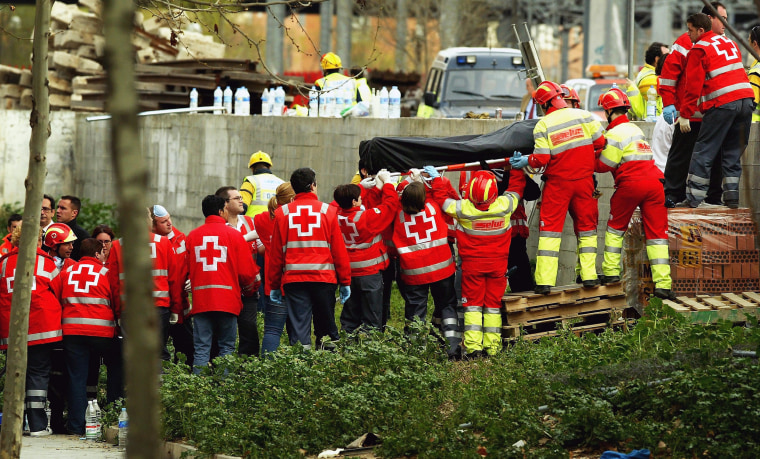Spain remembers the 3/11 terrorist attack and lessons learned
Monday is a somber anniversary in Spain.
Twenty years ago on March 11, 2004, 10 bombs detonated almost simultaneously on four commuter trains in Madrid. The blasts initially killed 191 people and injured over 1,800 commuters during the morning rush hour.
The Madrid train bombing is the second-deadliest terrorist attack in Europe, after the takedown of Pan Am Flight 103 over Lockerbie, Scotland, in 1988.
Initial reports attributed the Madrid attack to an independent local terrorist cell. But conclusive evidence has since connected the train bombing with the Sept. 11 attack in the United States, which had happened 30 months earlier.
“We now know, based on the research that has been done by Spanish investigators, that the attack of March 11 was an Al Qaeda operation,” said Bruce Riedel, a former CIA analyst and an expert on the Middle East. “And that the cell that carried out the operation had also been in touch with the cell that had also carried out 9/11. So this is very much relevant to Americans looking back at the events of 9/11.”
Riedel served in the White House on Sept. 11, 2001, as a senior adviser to President George W. Bush. And he describes the terrorist attack as “the defining moment for Americans born in the last half-century.”
“9/11 was a national trauma for the United States. It led to a massive rally around the flag,” he said. “While we may have forgotten 20-something years later, there was bipartisan support for going into Iraq and toppling the Taliban in Afghanistan.”
But the decision to go into Iraq, Riedel said, would ultimately weaken that bipartisan support and polarize the country between those in favor and those against the war.
Nevertheless, he also pointed out that in addition to both wars, Sept. 11 transformed the American government with the creation of the Department of Homeland Security and the National Counterterrorism Center.
In Spain, with the bombing happening just three days before the national election, the country faced deep divisions.
“The disunity stemmed from differing attributions of blame for the commuter train massacre,” terrorism expert Fernando Reinares wrote in the book “Al-Qaeda’s Revenge,” which contains a forward from Riedel and received an award from the association for the victims of 3/11.

“The aftereffects of that disunity persisted for well over a decade,” Reinares wrote, breaking them down in the book.
Those on the right tended to believe that ETA, the Basque nationalist and separatist organization classified as a terrorist group by Spain, was implicated in the Madrid bombing, as the Spanish government initially reported. And those on the left tended to believe that the bombing was payback for Spain’s participation in the Iraq War.
Both beliefs, Reinares wrote, are false.
“There is no direct or indirect evidence that ETA was somehow involved in the bomb attacks. Nor is it true that the idea of perpetrating a massacre in Madrid originated in response to the presence of Spanish soldiers on Iraqi soil,” he wrote.
Reinares pointed out in the book that the decision to carry out a terrorist attack was made in December 2001 in Karachi, Pakistan. And recruitment efforts for a 3/11 network began in March 2002, “well over a year before the Iraq invasion would take place.”
In Spain, the idea of a local home group being the mastermind of the Madrid attack persisted, even after the National Court handed down sentences ranging from three to 43,000 years in 2007 over the train bombings.
One of the main targets of the Spanish investigation, Amer Azizi, whom an indictment called a leader of a Spanish Al Qaeda cell and who was indicted a month after the 3/11 attacks on charges of helping plan the 9/11 terrorist attacks, was still at large during the trial.
The 2022 documentary “11M: Terror in Madrid” reported that his death became publicly known after Al Qaeda confirmed it in 2009.
“Azizi’s importance was not understood until he was killed with his boss, Hamza Rabia,” Manuel R. Torres, a political science professor at Pablo de Olavide University, said in the documentary.
According to Reinares’ book, Azizi got approval from Al Qaeda for an attack on Madrid and became a key go-between of the top leaders of the terrorist organization in Pakistan and the 3/11 network in Spain.
In retrospect, Riedel said that underestimating Al Qaeda and shifting focus to Iraq was a big mistake that cost both the U.S. and Spain lives and money.
“We should have kept our eye on the ball and continued after 9/11 to pursue Al Qaeda relentlessly until we had destroyed the leadership. Instead, we went into the wrong desert and chased the wrong…
Read More: Spain remembers the 3/11 terrorist attack and lessons learned

